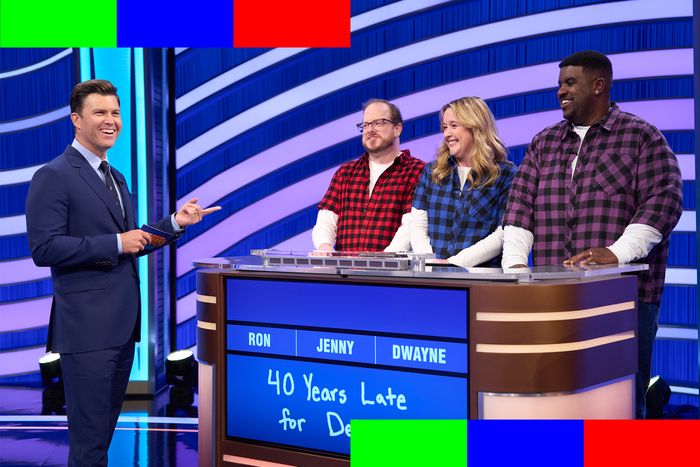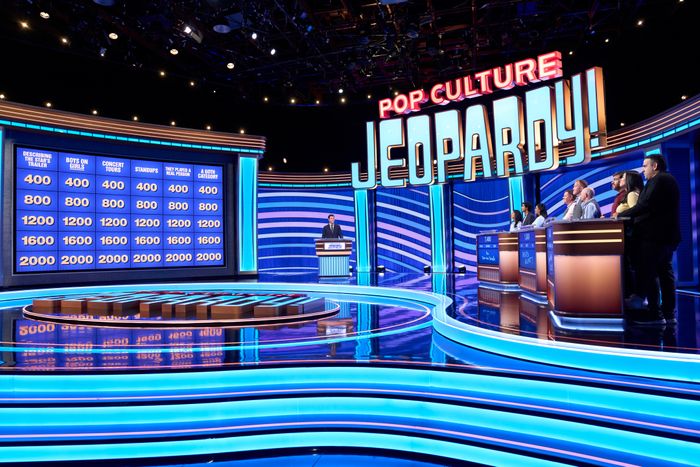
A few months after taking its first big step into game shows with the Patton Oswald-hosted The 1% Club, Prime Video is getting ready to quadruple down on the genre. Starting next month, the Amazon-owned streamer plans to launch four new game shows within a seven-week space, from the Travis Kelce-hosted Are You Smarter than a Celebrity? to a Jeopardy! spinoff focused on pop culture and emceed by SNL’s Colin Jost. While Prime’s focus on game shows is interesting by itself, even more notable is how the streamer is planning to release and market these shows.
Taking a page from the days when broadcast networks drew millions with “Must-See TV” Thursday and “TGIF,” Buffering has learned that Prime will drop fresh episodes of three of its new game shows at the same time every week, dubbing the virtual programming block “Winning Wednesdays.” The goal: Create an opportunity for viewers — particularly families — to open the Prime Video app weekly and find a complete night of thematically-similar entertainment.
While this is pretty much Linear TV 101, major streamers have mostly resisted such overt attempts to create weekly lineups. But Lauren Anderson, the Amazon executive overseeing Prime’s game show push, argues there should be no shame in borrowing from the traditional TV playbook. “Increasingly, the line between what is broadcast and what is streaming is becoming incredibly blurry,” says Anderson, whose official title is head of brand and content innovation for Amazon MGM Studios. “A lot of customers like some of those patterns that were developed on the broadcast side, even as they like the convenience of streaming.”
This isn’t the first time Amazon has shown a willingness to break away from the streaming herd when it comes to release patterns and programming strategies. With the aforementioned 1% Club, the streamer struck a deal with Fox Broadcasting which resulted in episodes of the series (initially envisioned as a Prime-only show) premiering on linear TV and then streaming exclusively hours later on Prime (but not Hulu, where all other Fox primetime shows live). And Prime sibling streamer Freevee releases new episodes of Judge Judy Sheindlin’s Judy Justice five days a week, Monday through Friday, mimicking the air pattern of her decades-long syndicated show.
“In the same way that we looked at Judy and we said, ‘Yeah, we can do daily programming,’ the same thinking went into, ‘Okay, we’re doing game shows and this is an opportunity to give customers a thing that they want in a way that they want it’,” Anderson says, adding that streaming programmers need to be open to a wide range of release strategies: “The question that I like to ask myself and that I want the team to ask is, ‘Why not?’”
Because this programming-block approach is new for Prime — as are game shows, for that matter — Prime will be easing into the launch of the Winning Wednesdays, giving each of its new titles its own moment in the sun and experimenting slightly with how many episodes get dropped each week. Here’s how the rollout will work (check out a promo for the new lineup, including the first look at Pop Culture Jeopardy!, below):
➽ Are You Smarter Than a Celebrity? will be first out the gate, arriving Wednesday, October 16, with a mini-binge release of its first three episodes. One new episode will then premiere every Wednesday through mid-February (for a total of 20.) The series offers a twist on Fox’s successful mid-aughts quizzer Are You Smarter than a Fifth Grader? by putting one contestant in a “classroom” of five famous folks from the worlds of comedy, sports and entertainment, including Nikki Glaser, Nicole Byer, Chad Ochcocinco, and Lala Kent.
➽ Two weeks later, on Oct. 30, Prime premieres Buy It Now, a Shark Tank-esque hybrid reality/game show hosted by J.B. Smoove in which various entrepreneurs get a chance to pitch their products, first to a studio audience and then to a rotating panel made up of Amazon execs and celebrity business owners such as Gwyneth Paltrow, Anthony Anderson, and Christian Siriano. Winning entrepreneurs get added to a “Buy It Now” storefront on Amazon (synergy!), while one contestant each episode also gets a $20,000 cash prize. After a three-episode premiere, new eps will roll out weekly through January 8.
➽ Right before Thanksgiving, on Nov. 20 comes Wish List Games, a half-hour hosted by The Masked Singer’s Nick Cannon in which contestants compete against each other in a series of over-the-top games and challenges. The prize: Everything on the contestant’s Amazon Wish List (up to $25,000). Unlike the other titles on the Prime game show lineup, Wish List Games will stream all five episodes at once, serving as a sort of holiday event.
➽ The final and arguably biggest part of the “Winning Wednesdays” puzzle drops on Dec. 4 with the premiere of Pop Culture Jeopardy! Three-person teams will compete tournament-style in the spin-off of the long-running syndicated quizzer, with Jost serving as host. Prime has ordered a whopping 40 episodes of the new Jeopardy!, allowing it to premiere three new episodes weekly through February.
Once the new incarnation of Jeopardy! debuts, Prime’s Winning Wednesdays will be fully stacked with five episodes of three different game/competition shows releasing weekly, essentially recreating the feel of a broadcast network primetime lineup, but for a streaming audience. Interestingly, Anderson says she and her team didn’t settle on the idea of creating a game show block until well after the shows were ordered into production. “It wasn’t intentional,” she says. “They were all produced on different cycles and schedules. But as we got them in, we said, ‘Oh, this would be awesome.’ We really wanted to plant a flag.”
Anderson, who credits Prime’s scheduling team with hatching the throwback approach to releasing the show, said she thinks rolling them out under the broad banner of “Winning Wednesdays” could help them stand out. It also helps that, unlike scripted shows where eight or ten episodes have become the norm, game shows can still produce lots of episodes at a cost-effective price. “You can do fun, interesting, and different things when you have enough episodes to play with,” Anderson says.
While the ability to make a lot of episodes fairly inexpensively played a role in Prime’s decision to dive into game shows, Anderson says quizzers’ historical popularity with TV audiences was a bigger motivation. “It’s one of these genres that has been around for a bit, and it stays around, because people love it,” she says, noting that older game shows perform well on Amazon’s Freevee platform, which includes content from game show networks Buzzr and GSN. And the fact that games are generally family-friendly makes it easier to aggregate bigger audiences and intergenerational co-viewing, more important than ever now that Prime Video, by default, is an ad-supported service. “Game shows are so big-tent,” Anderson explains. “People love them, and they’re fun for the entire family. All the choices that I make are always going to be driven first by, ‘What do audiences respond to?’.”
While it’s too soon to say whether the Winning Wednesdays block will continue with a new batch of game shows once these initial four series reach the end of their first seasons in February, Anderson hints it’s possible, at least in theory. “We do have other things coming up on the other side of what we’ve already announced,” says. “But we also don’t want to get too ahead of ourselves. We want to see how audiences respond to this, and then let that inform” the scheduling of other game-adjacent content, including a reboot of American Gladiators announced in June. That project, along with Are You Smarter?, is a direct result of Amazon’s purchase of MGM, and Anderson says there are other game and game-related shows from the storied studio the company is considering developing. “We’re really excited about the library that came to us with MGM,” she says.
Anderson’s excitement about game shows is also somewhat personal: The exec says she still often watches old episodes of classic titles, particularly ones which feature celebs of the day, such as The $25,000 Pyramid. “I really enjoy looking back on the guests who were on and the conversations that they were having,” she says. “I like living in that space.” Indeed, when asked by a game-show obsessed reporter whether she’s explored reviving other classic formats, Anderson admits she has done exactly that, citing the 1990s hit Shop ‘Til You Drop as one example.
Unfortunately, the realities of the TV business means it’s not always easy to resurrect long-dormant titles. “Some of these things are a little complicated,” she says. “There are layers that even I’m l finding out about with regard to the rights. It’s often challenging. Even some of the shows that we are doing — it takes persistence to get these things across the line. But I’m nothing if not persistent.”


